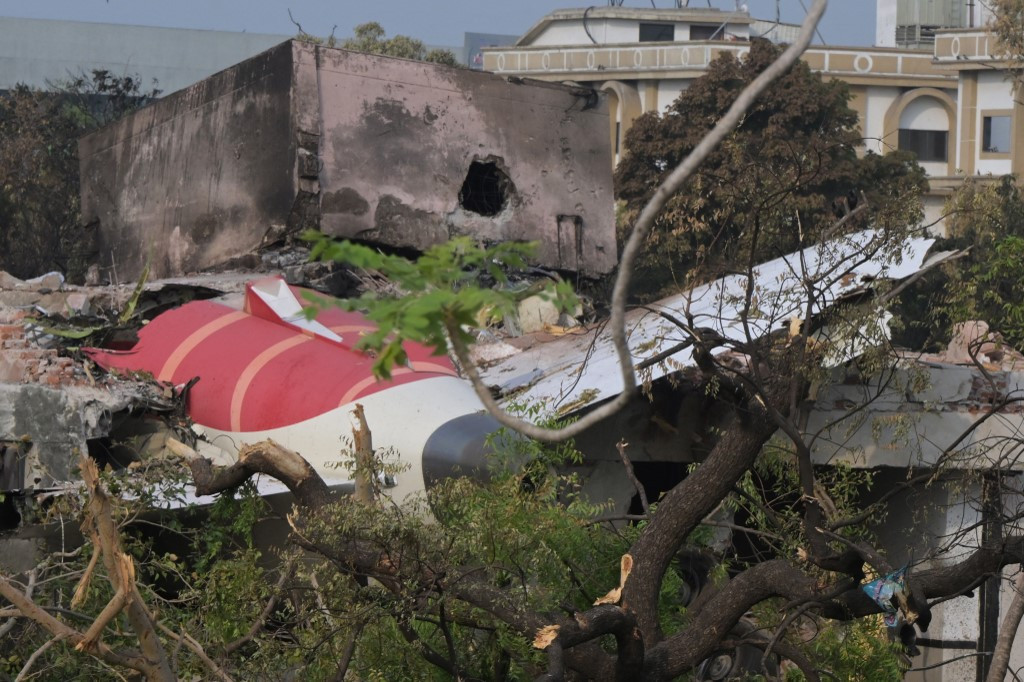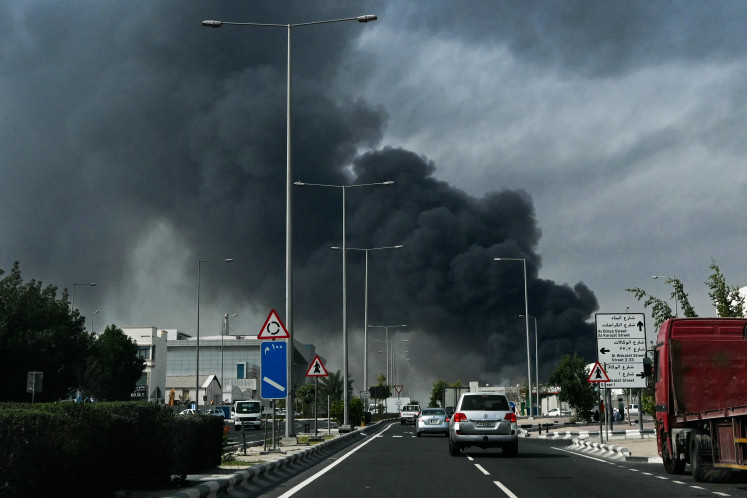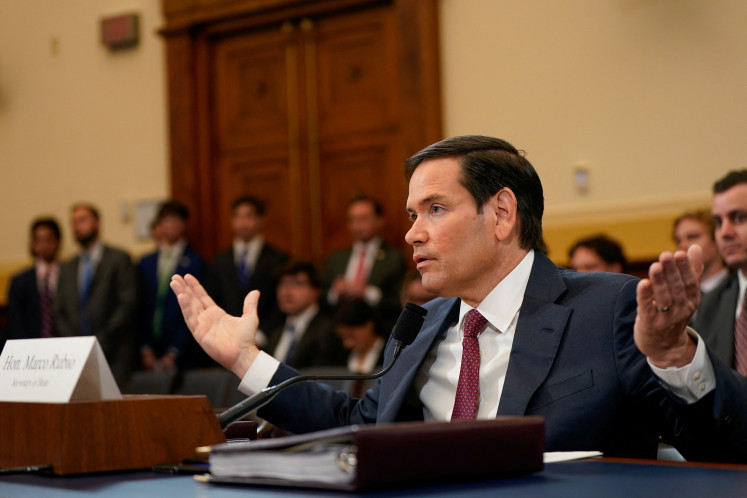Popular Reads
Top Results
Can't find what you're looking for?
View all search resultsPopular Reads
Top Results
Can't find what you're looking for?
View all search resultsAir India crash rekindles debate over cockpit video recorders
Aviation experts have said a preliminary report from India's Aircraft Accident Investigation Bureau (AAIB) raised questions over whether one of the pilots of Air India flight 171 cut off fuel to the Boeing 787's engines seconds after takeoff, leading to an irrecoverable situation.
Change text size
Gift Premium Articles
to Anyone
 Wreckage showing the tail section of the Air India Boeing 787-8 is pictured in a residential area near the airport in Ahmedabad on June 14, 2025, after the aircraft operating as flight 171 crashed shortly after taking off on June 12. Investigators recovered a black box recorder on June 13 from the crash site of a London-bound passenger jet that ploughed into a residential area of India's Ahmedabad city, killing at least 279 people on board and on the ground. (AFP/Dibyangshu Sarkar)
Wreckage showing the tail section of the Air India Boeing 787-8 is pictured in a residential area near the airport in Ahmedabad on June 14, 2025, after the aircraft operating as flight 171 crashed shortly after taking off on June 12. Investigators recovered a black box recorder on June 13 from the crash site of a London-bound passenger jet that ploughed into a residential area of India's Ahmedabad city, killing at least 279 people on board and on the ground. (AFP/Dibyangshu Sarkar)
T
he deadly Air India crash last month has renewed a decades-old debate in the aviation industry over installing video cameras monitoring airline pilot actions to complement the cockpit voice and flight data recorders already used by accident investigators.
One of the industry's most influential voices, International Air Transport Association head Willie Walsh, a former airline pilot, said on Wednesday in Singapore there was a strong argument for video cameras to be installed in airliner cockpits to monitor pilot actions to complement voice and flight data recorders already used by accident investigators.
Aviation experts have said a preliminary report from India's Aircraft Accident Investigation Bureau (AAIB) raised questions over whether one of the pilots of Air India flight 171 cut off fuel to the Boeing 787's engines seconds after takeoff, leading to an irrecoverable situation.
The crash in Ahmedabad, India, killed 241 of the 242 people aboard, as well as 19 people on the ground.
As of now, "based on what little we know now, it's quite possible that a video recording, in addition to the voice recording would significantly assist the investigators in conducting that investigation on the issue of mental health," Walsh said.
Advocates for cockpit video cameras say the footage could fill in gaps left by the audio and data recorders, while opponents say concerns about privacy and misuse outweigh what they argue are marginal benefits for investigations.
Video footage was "invaluable" to Australian crash investigators determining what led to Robinson R66 helicopter breaking up in mid-air in 2023, killing the pilot, the only person aboard, according to the Australian Transport Safety Bureau's final report, which was released 18 days after the Air India crash.
The video showed "the pilot was occupied with non-flying related tasks for much of this time, specifically, mobile phone use and the consumption of food and beverages," the report said.
The ATSB commended Robinson Helicopters for providing factory-installed cameras and said it encouraged other manufacturers and owners to consider the ongoing safety benefits of similar devices.
In 2000, US National Transportation Safety Board (NTSB) Chairman Jim Hall urged the Federal Aviation Administration to require commercial airliners be equipped with cockpit image recorders.
Hall's recommendation came in the wake of 1999's Egyptair Flight 990 crash, when the first officer intentionally crashed the Boeing 767, according to the NTSB, killing all 217 people on board.
"In the balance between privacy and safety, the scale tips toward safety, unequivocally," air safety expert and former commercial airline pilot John Nance said. "Protecting the flying public is a sacred obligation."
Another aviation safety expert, Anthony Brickhouse, said that as an accident investigator, he is in favor of cockpit video, but acknowledged that commercial pilots have real concerns.
Video on Air India flight 171 "would have answered lots of questions," he said.
Air India declined to comment. India's AAIB, which is expected to release a final report within a year of the crash under international rules, did not reply to request for comment.
US pilots' unions such as the Air Line Pilots Association (ALPA) and Allied Pilots Association (APA) say the voice and data recorders already provide enough information to determine the cause of a crash and that the cameras would be an invasion of privacy and could be misused.
Calls for cockpit cameras are an understandable reaction to "the stress of not knowing what happened immediately after an accident," said APA spokesperson Dennis Tajer, an American Airlines pilot.
"I can understand the initial reaction of the more information, the better," but investigators already have enough data to adequately determine an accident's cause, leaving no need for cameras, he said.
To make flying safer, current safety systems should be enhanced to record higher-quality data, rather than adding video cameras, an ALPA spokesperson said.
There are also concerns the footage could be used by airlines for disciplinary actions or that video could be leaked to the public after a crash, said John Cox, an aviation safety expert, retired airline pilot and former ALPA executive air safety chairman.
A pilot's death being broadcast on "the 6 o'clock news is not something that the pilot's family should ever have to go through," he said.
If confidentiality can be assured around the world, "I can see an argument" for installing cameras, Cox said.
Cockpit voice recordings are typically kept confidential by investigators in favor of partial or full transcripts being released in final reports.
Despite that, International Federation of Air Line Pilots Associations said it was skeptical that confidentiality could ever be assured for cockpit videos.
"Given the high demand for sensational pictures, IFALPA has absolutely no doubt that the protection of (airborne image recorder) data, which can include identifiable images of flight crewmembers, would not be ensured either," the organization said in a statement.
Boeing declined to disclose whether customers are able to order cockpit video recorders, while Airbus AIR.PA did not reply to request for comment.









